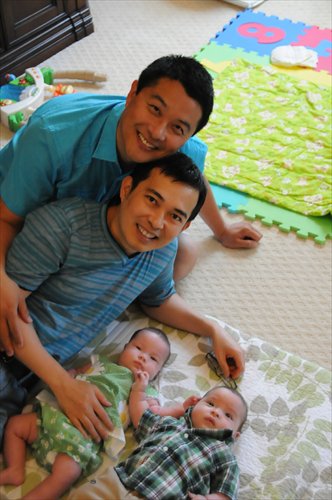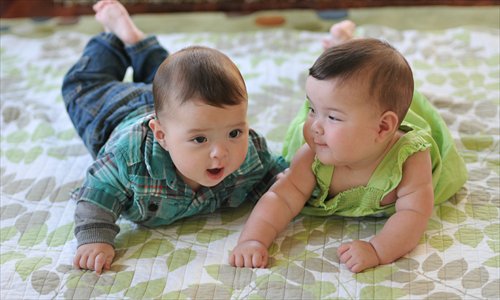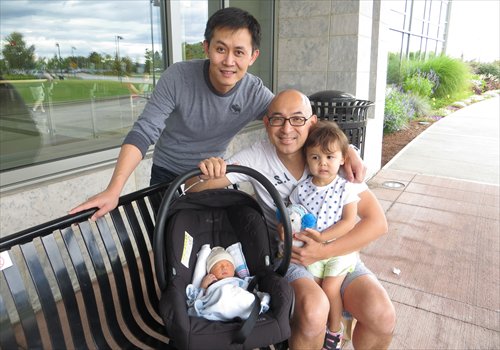Same-sex parenthood
Bing and Van were greeted with unexpected gifts from their 2-year-old twins Tyler and Gloria when they picked them up from kindergarten earlier this month. The toddlers each held flower pots painted with red and yellow ladybugs and the words: "I love you Baba and Daddy."
Both men, who did not want their full identities revealed, were touched by their Mother's Day gifts.
"They were the first gifts they had given us. We were so excited and moved," said 42-year-old Bing, better known as "baba" (father) to the twins. Originally from Baoding, Hebei Province, Bing has taught in the US as a university professor for more than a decade.
Bing and his Vietnam-born husband Van, who is also a university professor, received an e-mail from their children's kindergarten teacher in the lead up to Mother's Day seeking advice on how to teach their kids about the day's meaning.
"We are teaching [the twins] about the different family structures. Some children are raised by single mothers, some by single fathers, some by two dads, and so on. Gloria and Tyler have two dads, so we celebrate both dads on both Mother's Day and Father's Day," Bing said.
As a growing number of countries move to legislate same-sex marriage and strengthen rights for gay parents, gay couples in China still face financial, cultural and legal hurdles in raising children.

Van (left) and Bing with their twins Tyler and Gloria, who were born via a surrogate in 2012. Photo: Courtesy of Bing
Daddy duo
Bing and Van met while studying in Denmark in 1998.
It was love at first sight for the couple, who after becoming naturalized US citizens married in Washington in 2011.
Bing and Van first desired to become parents a decade ago. Due to the high surrogacy costs, however, their shared dream of fatherhood wasn't realized until 2012 when Tyler and Gloria were born. The surrogate and egg donor were both Caucasian American women, with Bing's sperm used for in vitro fertilization (IVF).
"It's a large project. There were about six lawyers involved in the whole process, from finding the agents to the registration of Van and I as fathers on the birth certificates," said Bing, who said surrogacy services can cost as much as 2 million yuan ($321,192).
Surrogacy is not outlawed in China, but the industry has been underground since 2001 when the Ministry of Health banned trading of fertilized eggs and embryos, and prohibited medical institutions from performing surrogacy procedures.

Twins Tyler (left) and Gloria were born via surrogate to married gay couple Bing and Van. Photo: Courtesy of Bing
Do-it-yourself surrogacy
IVF behind closed doors is a preferred choice for some lesbian couples wanting children fertilized with their own eggs without the expensive services of a surrogate.
British woman Heidi (pseudonym) underwent IVF at home with her Chinese lesbian partner in 2008 using a friend's sperm. She told her story with A Qiang, executive director of Parents, Families and Friends of Lesbians and Gays in China.
"It's pretty easy. You only need to learn about the correct method online and used a clean syringe," Heidi was quoted as saying by A Qiang. Heidi and her partner moved to Britain shortly after the 2008 birth of their son in Beijing.
Heidi's parents were delighted at the arrival of their first grandchild, with her mother coming to Beijing to help care for the boy after the birth. But it was a different story for her Chinese partner, whose parents both declined to meet their grandson, said A Qiang.

Xue (left) and Yang with their son and daughter. Photo: Courtesy of Xue
Barriers to adoption
A married gay couple surnamed Yang and Xue, both 45 and from Taiwan and Suzhou, Jiangsu Province, respectively, spent about $240,000 on gestational surrogacy and other medical costs for the births of their 3-year-old daughter, fertilized with Xue's sperm, and 9-month-old son, fertilized with Yang's sperm. Despite the high expenses, the couple was determined to raise their own biological children.
"Unlike most foreign gay couples I know who prefer adoption, Chinese gay couples want their 'own children' because of cultural traditions that emphasize the value of carrying the family lineage," said Yang, a teacher at a special-education school in Maryland, US.
But for Chinese gay couples who prefer adoption, laws at home pose a major hurdle.
A 2005 statement released by the China Center of Adoption Affairs, a government-backed adoption organization, declared that the center "doesn't seek homosexuals as adoption candidates."
In addition to concealing their sexuality, gay men or women hoping to adopt a child in China must register as single because same-sex marriage and civil unions are not recognized under Chinese law. A single man adopting a girl in China must be at least 40 years older than her, which A Qiang describes as "ridiculous."

Yang (left) and Xue accompany their daughter on a walk. Photo: Courtesy of Xue
Being honest with kids
Despite a reputation of Chinese fathers as "eagle dads," Bing considers Van the stricter father of the couple with higher disciplinary standards. Both men's parents have also helped care for the twins, despite different beliefs on the best parenting methods occasionally clashing.
In Chinese culture, grandparents are accustomed to spoiling their grandchildren and doting over them at their every whim. However, Van prefers to take a tougher line and avoid caving in to the twins' demands when they cry.
"I support Van in such situations. It's important to let our children figure out where the boundaries are," said Bing. "Everything we do is for their benefit, which my parents are gradually understanding."
In order to educate their children about their fathers' relationship and family structure, Yang and Xue decided to have the "big chat" sooner rather than later.
"Before our children were born, we were more in closet [as a couple]. But since the birth of our children, we think it's important to be honest with them both," said Yang. "This way, our children feel that their family is no different from anyone else's. We have nothing to hide."
Xue also believes honesty to be the best policy when raising children as gay parents, for their benefit as much as a couple's. "Being different is not a big deal. Diversity has different forms. It's important to tell children that it is not right to be prejudiced," he said.
Future outlook
Opinions among experts in China are divided over whether gay couples should have greater rights to adopt children or have their own through surrogacy. Wang Lihua, who has 19 years' experience as an early childhood teacher, said the most important thing for children is that they are raised in a loving environment, irrespective of their parents' sexuality.
"How gay couples deal with social pressure and other factors affecting their situation has a fundamental influence on children. It's important to give children enough love and let them know love is a fundamental necessity for a family," said Wang.
But not everyone is convinced Chinese children are ready to be raised by gay parents. Chu Zhaohui, a research fellow at the National Institute of Education Sciences, said children raised by gay parents would face intense pressure under China's current social climate. He also warned such a family structure could have a "negative influence" on their character.
"In families with heterosexual parents, there is a mother and father who represent the yin and yang. Having two fathers could present an overly masculine environment in which to raise a girl," said Chu, who conceded that no study had ever made such a finding.
A Qiang said that a big advantage for children raised by gay couples is that their parents have usually given serious consideration to their upbringing and are often financially secure.
"There is growing demand to have children from gay couples in China. We have set up QQ and WeChat groups for those who have children and want to offer their advice to prospective parents," he said, adding that his organization is planning campaigns to promote public debate on the issue.
A Qiang hopes that in the next decade Chinese laws will be more accommodating to gay couples seeking to have children through adoption and surrogacy.
"Changing social attitudes loom as an important first step before we change laws," said Chu.
Newspaper headline: Gay couples in China set sights overseas to realize dreams of raising children